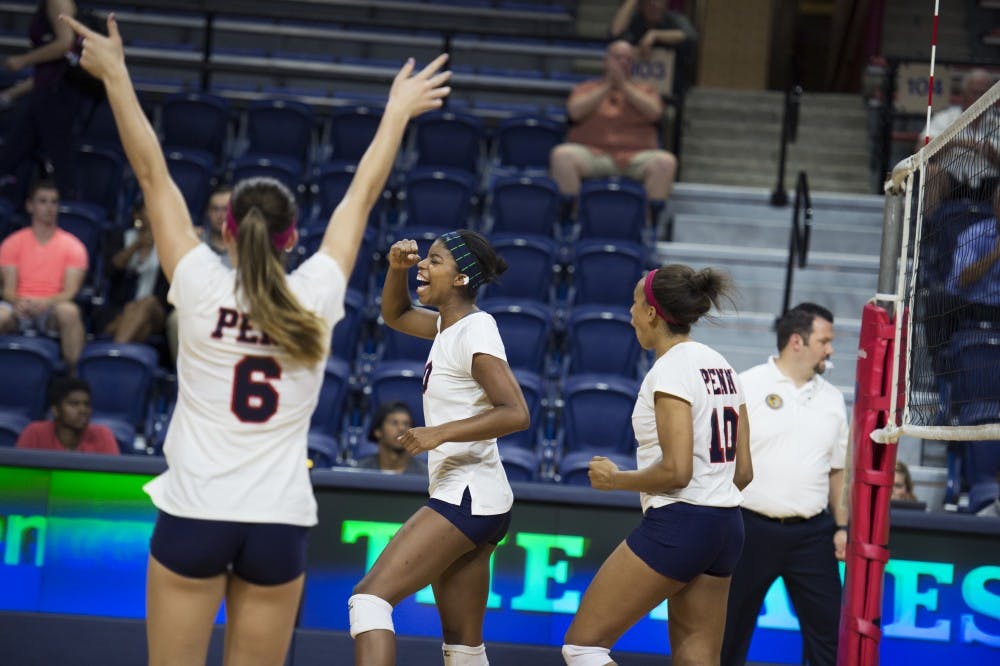
Last week against Delaware, Jasmine DeSilva proved that she was capable of coming back from injury even stronger.
Credit: Alex Fisher , Alex FisherWith a kill in the opening set of Penn volleyball’s opening game, Jasmine DeSilva’s 2014 season was off to a quick start. But the end would come just as quickly.
A few points later, DeSilva felt in her knee a sensation that many athletes refer to with dread as “The Pop.”
“I pretty much knew what I had done to it right then,” DeSilva, now one of Penn volleyball’s five senior captains, said.
“The Pop” is perhaps the most telling symptom of an ACL tear, which ended up being only part of DeSilva’s diagnosis: A torn ACL, MCL and meniscus.
“That was a terrible moment. ... It was really hard to watch that happen and watch her have to go through the whole recovery process,” DeSilva’s classmate and co-captain Alexis Genske said.
“It was pretty upsetting,” DeSilva admitted.
But the Maryland native didn’t spend much time feeling sorry for herself. After her surgery, DeSilva travelled with the team, never missing a game or practice. Even if she couldn’t step on the court, she couldn’t peel herself away from the action, there was too much work to be done.
“When such a bad injury like that happens, you have to focus on something else. I really picked up my communication with my team, trying to figure out another role I could fill,” DeSilva said.
“If I couldn’t help them on the court, then how could I help them off the court? We had freshman outside hitters stuck in that role [replacing me]. And I remember as a freshman, feeling so overwhelmed, and I didn’t even have to play every point as a freshman. So I wanted to help them any way I could. I gave them all the advice I could, and that really got me through the recovery.”
Now, DeSilva is back, and the people around her can see that a year off the court was most certainly not a year wasted.
“When Jasmine was out, that’s when she really stepped forward and became the leader she is today,” coach Kerry Carr said. “I’m not sure that would have happened without the injury.”
“She came in this year a lot hungrier than anybody else on the team,” Genske said. “After you sit out for a year, I think you just come in ready to play, and ready to play hard. Especially since we’re seniors, she really feels that there’s no reason not to leave it all on the court and just go for it. She does a really good job of reminding us of that any time we’re not feeling like ourselves, if we’re coming out quieter or less confident than we should be. She never lacks confidence.”
“You see the court so much better when you’re off the court,” DeSilva said. “I learned so much sitting back and watching. I’m a way more consistent player now, I hit smarter shots, I feel like I know what to do if we’re out of system — all these little skills I didn’t have before, I have now.”
“She’s such a smart player out there,” Carr echoed. “She doesn’t make the same mistakes she made in [previous] years. And physically, she’s just as good a player that left the court. In fact, I think she’s stronger, because she really got the chance to hit the weight room and lift more than she had been.
“To take something that could have been terrible and ended her career and make it into something that pushes her career even higher, it’s amazing.”
“I was most worried about coming back and not being the same player,” DeSilva said.
“But I’m actually glad I’m not that same player.”
The Daily Pennsylvanian is an independent, student-run newspaper. Please consider making a donation to support the coverage that shapes the University. Your generosity ensures a future of strong journalism at Penn.
DonatePlease note All comments are eligible for publication in The Daily Pennsylvanian.







